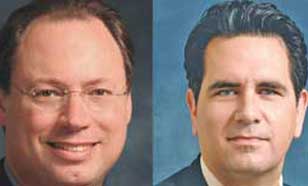Joseph N. Argentina Jr.

November 20, 2015 | The Legal Intelligencer
Casino Not Liable to Return Proceeds of Fraudulent TransfersIn most bankruptcy cases where the business is being sold or liquidated, the two primary sources of funds for distribution to creditors are sale proceeds and avoidance claim recoveries from preference and fraudulent transfer actions. Fraudulent transfer actions can be quite complex. Interesting issues arise when the defendant is not the initial recipient of the fraudulent transfer from the debtor, but rather a subsequent recipient of those funds. In many of these cases, the subsequent transferee never did any business with the debtor itself, actually extended value to the initial recipient of the fraudulent transfer, and found itself embroiled in litigation with the bankruptcy trustee of the debtor's estate. Such a situation was recently reviewed by the U.S. Court of Appeals for the Seventh Circuit in Brandt v. Horseshoe Hammond LLC, Case No. 14-2174 (7th Cir. Oct. 13, 2015). In this case, the court reviewed whether a bankruptcy trustee could recover over $8 million from a casino where the debtor's principal gambled regularly for years with funds fraudulently transferred to him and his wife from the debtor. While the court ultimately affirmed the district court's grant of summary judgment in favor of the casino, this case illustrates the dangers of unknowingly dealing with recipients of fraudulent transfers.
By Andrew C. Kassner and Joseph N. Argentina Jr.
9 minute read

November 19, 2015 | The Legal Intelligencer
Casino Not Liable to Return Proceeds of Fraudulent TransfersIn most bankruptcy cases where the business is being sold or liquidated, the two primary sources of funds for distribution to creditors are sale proceeds and avoidance claim recoveries from preference and fraudulent transfer actions. Fraudulent transfer actions can be quite complex. Interesting issues arise when the defendant is not the initial recipient of the fraudulent transfer from the debtor, but rather a subsequent recipient of those funds. In many of these cases, the subsequent transferee never did any business with the debtor itself, actually extended value to the initial recipient of the fraudulent transfer, and found itself embroiled in litigation with the bankruptcy trustee of the debtor's estate. Such a situation was recently reviewed by the U.S. Court of Appeals for the Seventh Circuit in Brandt v. Horseshoe Hammond LLC, Case No. 14-2174 (7th Cir. Oct. 13, 2015). In this case, the court reviewed whether a bankruptcy trustee could recover over $8 million from a casino where the debtor's principal gambled regularly for years with funds fraudulently transferred to him and his wife from the debtor. While the court ultimately affirmed the district court's grant of summary judgment in favor of the casino, this case illustrates the dangers of unknowingly dealing with recipients of fraudulent transfers.
By Andrew C. Kassner and Joseph N. Argentina Jr.
9 minute read

October 02, 2015 | The Legal Intelligencer
Bankruptcy Plans Go Up in Smoke: Marijuana Grower Denied ReliefThe ability to obtain a discharge of a person's debts in bankruptcy—either through a reorganization of his or her affairs or liquidation proceeding administered by a court-appointed trustee—is a fundamental benefit of filing for bankruptcy. When a debtor's prepetition actions involve fraud, concealment, or other examples of a lack of good faith, bankruptcy courts dismiss such "bad faith" filings, thereby denying debtors the protections and benefits of the federal bankruptcy law. Usually bad faith involves fraud, concealment, or other types of white-collar criminal activity. Debts arising from other types of tortious conduct are also excepted from being discharged.
By Andrew C. Kassner and Joseph N. Argentina Jr.
8 minute read

October 01, 2015 | The Legal Intelligencer
Bankruptcy Plans Go Up in Smoke: Marijuana Grower Denied ReliefThe ability to obtain a discharge of a person's debts in bankruptcy—either through a reorganization of his or her affairs or liquidation proceeding administered by a court-appointed trustee—is a fundamental benefit of filing for bankruptcy. When a debtor's prepetition actions involve fraud, concealment, or other examples of a lack of good faith, bankruptcy courts dismiss such "bad faith" filings, thereby denying debtors the protections and benefits of the federal bankruptcy law. Usually bad faith involves fraud, concealment, or other types of white-collar criminal activity. Debts arising from other types of tortious conduct are also excepted from being discharged.
By Andrew C. Kassner and Joseph N. Argentina Jr.
8 minute read

August 21, 2015 | The Legal Intelligencer
Third Circuit Again Reviews Equitable Mootness DoctrineUnlike most civil litigation that includes a limited number of parties and disputes regarding discrete claims or specific corporate assets, a Chapter 11 reorganization plan by definition involves all of the debtor's business, assets, capital structure and stakeholders. When a plan is approved over the objection of one or more interested parties and no stay pending appeal is obtained, the capital structure is usually completely altered, financing closed and assets conveyed. The question presented in these situations is whether an appeal should be allowed to proceed if no stay is obtained and implementation of the plan proceeds, or should the appeal be dismissed under the doctrine of "equitable mootness."
By Andrew C. Kassner and Joseph N. Argentina Jr.
9 minute read

August 20, 2015 | The Legal Intelligencer
Third Circuit Again Reviews Equitable Mootness DoctrineUnlike most civil litigation that includes a limited number of parties and disputes regarding discrete claims or specific corporate assets, a Chapter 11 reorganization plan by definition involves all of the debtor's business, assets, capital structure and stakeholders. When a plan is approved over the objection of one or more interested parties and no stay pending appeal is obtained, the capital structure is usually completely altered, financing closed and assets conveyed. The question presented in these situations is whether an appeal should be allowed to proceed if no stay is obtained and implementation of the plan proceeds, or should the appeal be dismissed under the doctrine of "equitable mootness."
By Andrew C. Kassner and Joseph N. Argentina Jr.
9 minute read

June 29, 2015 | The Legal Intelligencer
Third Circuit Addresses Structured Dismissal of Bankruptcy CaseOver the years, companies often file Chapter 11 bankruptcy and, for a number of reasons, never make it through the entire process to approval of a Chapter 11 plan of reorganization. In some cases, the company is unable to reorganize and the case is converted to a liquidation proceeding under Chapter 7. In other instances, the court determines that the debtor did not commence the case in good faith for a proper reorganization purpose and dismisses the proceeding.
By Andrew C. Kassner and Joseph N. Argentina Jr.
9 minute read

June 27, 2015 | The Legal Intelligencer
Third Circuit Addresses Structured Dismissal of Bankruptcy CaseOver the years, companies often file Chapter 11 bankruptcy and, for a number of reasons, never make it through the entire process to approval of a Chapter 11 plan of reorganization. In some cases, the company is unable to reorganize and the case is converted to a liquidation proceeding under Chapter 7. In other instances, the court determines that the debtor did not commence the case in good faith for a proper reorganization purpose and dismisses the proceeding.
By Andrew C. Kassner and Joseph N. Argentina Jr.
9 minute read

April 21, 2015 | Delaware Business Court Insider
Fiduciary Duties of Bankrupt Nursing Home's Officers, DirectorsA recurring theme in our columns is how directors' and officers' fiduciary duties are examined as the corporation approaches financial distress. In fact, we have been following the case long enough that today we report again on a U.S. Court of Appeals for the Third Circuit case styled Official Committee of Unsecured Creditors on Behalf of the Estate of Lemington Home for the Aged v. Baldwin, No. 13-2707 (3rd Cir. Jan. 26, 2015), that we wrote on more than three years ago.
By Andrew C. Kassner and Joseph N. Argentina Jr.
9 minute read

April 21, 2015 | Delaware Business Court Insider
Fiduciary Duties of Bankrupt Nursing Home's Officers, DirectorsA recurring theme in our columns is how directors' and officers' fiduciary duties are examined as the corporation approaches financial distress. In fact, we have been following the case long enough that today we report again on a U.S. Court of Appeals for the Third Circuit case styled , No. 13-2707 (3rd Cir. Jan. 26, 2015), that we wrote on more than three years ago.
By Andrew C. Kassner and Joseph N. Argentina Jr.
9 minute read
Trending Stories
- 1Call for Nominations: Elite Trial Lawyers 2025
- 2Senate Judiciary Dems Release Report on Supreme Court Ethics
- 3Senate Confirms Last 2 of Biden's California Judicial Nominees
- 4Morrison & Foerster Doles Out Year-End and Special Bonuses, Raises Base Compensation for Associates
- 5Tom Girardi to Surrender to Federal Authorities on Jan. 7
More from ALM
- Scan In Progress: Litigators Leverage AI to Screen Prospective Jurors 1 minute read
- Legal Speak at General Counsel Conference East 2024: Match Group's Katie Dugan & Herrick's Carol Goodman 1 minute read
- Legal Speak at General Counsel Conference East 2024: Eric Wall, Executive VP, Syllo 1 minute read



